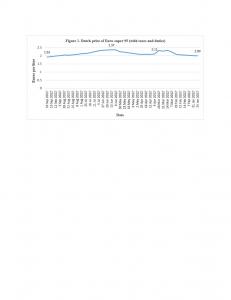Allaying the Nervousness in the Dutch Oil Market
However, it is worth considering a few developments that could help to calm the current nervousness. First, drawing on consolidated data on sea-borne crude oil movements and other market intelligence, Refinitiv Eikon (a financial markets data provider within the London Stock Exchange Group) reported that significant tonnages of non-Russian crude were beginning to flow into European refineries. In particular, the vast bulk of the production from Norway’s John Sverdrup oil field was being redirected to Europe from customers in Asia.
Second, more sea-borne crude oil cargoes from the US, West Africa, Egypt, Norway and Britain’s North Sea were being consigned to refineries in Poland, notably Gdansk which has a capacity of 210,000 barrels per day (b/d) and Plock (270,000 b/d).
Third, Saudi Aramco plans to leverage an MOU with Poland’s PKN Orlen to deliver up to 400,000 b/d of Arabian crude into Orlen’s petrochemical network. This is made possible by Saudi Aramco’s acquisition of a 30 per cent equity stake in the Gdansk refinery.
So, through a combination of excise duty relief, prudent supply chain diversification, conservation and inward investment, creative ways are being explored to mitigate any potential shock to sea-borne oil supplies to Europe, including the Netherlands. On another level, there is growing recognition of the likely commercial benefit of harnessing the interconnectedness of the energy ecosystems of Europe and the Middle East. This is placed into sharp relief by recent projections that about 1 million b/d of new refining capacity is likely to be added in the Middle East between 2022 and 2023. Approximately 70 per cent (or 700,000 b/d) of this is scheduled to come online this year, according to the International Energy Agency.
A word of caution is, however, necessary. There is the lingering risk of disruption to either a portion or all of the roughly 1.5 million b/d of Kazakh crude supplied to the EU via the Caspian Pipeline Consortium (CPC). This crude is produced at the Tengiz oil field in Kazakhstan and then transported through the CPC up to the Black Sea port of Novorossiysk from where it becomes sea-borne crude destined for EU refineries. In this context, the Netherlands and its EU partners would do well to put in place appropriate strategies to mitigate the risk of supply disruption from this source. At the same time, EU refineries will need to work doubly hard to improve operational efficiency and minimise outages.
We end by calling attention to the bigger picture which is to attract greater inward investment into affordable, secure and sustainable energy diversification projects under the RePowerEU plan. For this purpose, the tapestry of business and compliance regulations will have to be reworked. Some clear pointers in this regard are presented in “The Business Ecosystem in the Middle East and Europe."
Philip Stafford Baker
Philip S. Baker Consulting
+1 876-337-6265
email us here
Legal Disclaimer:
EIN Presswire provides this news content "as is" without warranty of any kind. We do not accept any responsibility or liability for the accuracy, content, images, videos, licenses, completeness, legality, or reliability of the information contained in this article. If you have any complaints or copyright issues related to this article, kindly contact the author above.

